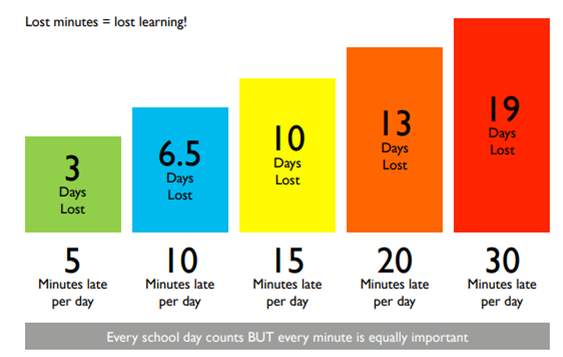
Attendance Aims
❖ Ensure that pupils are safe and that their whereabouts are known.
❖ Maximise attendance so that all pupils can gain full access to our curriculum and be enabled to reach their full academic potential and achieve a high level of personal and social well-being.
❖ Ensure that children enjoy coming to school and are highly motivated to attend regularly and consistently.
❖ Eliminate unauthorised absence.
❖ Discourage families from arranging holidays during school terms.
❖ Ensure that parents and carers understand clearly when it is appropriate to keep their children off school and when this constitutes unauthorised absence.
❖ Ensure that school staff and parents and carers are familiar with and adhere to our procedures for registering pupils’ attendance, reporting, recording and following up a pupil’s absence or lateness.
❖ Ensure that pupils and their parents and carers understand the importance of regular and consistent attendance.
❖ Make clear to parents and carers the consequences of failing to ensure that their children attend school.
What are my responsibilities regarding my child's school attendance?
The Education Act 1996 requires parents to ensure their children, of compulsory school age, receive efficient full-time education. The Local Education Authority can issue a fixed penalty notice for unauthorised absence. A fixed penalty notice can be given for a student who has 10 unauthorised absences (am and pm count as separate absences) from school in a 12-week period. Since September 2015, a child whose attendance is 90% or below is considered to be a ‘persistent absentee’ and can be referred to the Local Authority Attendance Officer.
Having good attendance also means being on time and not being late to school. Children who arrive late can feel embarrassed, left out and miss out on important introductions to lessons. Punctuality is an essential life skill that needs to be taught from the very beginning.
.png)


How can I help my child attend school regularly and on time?
❖ If your child does not want to go to school because they say they are worried or have a problem – talk with them to their teacher to better understand their worry/ problem and to find a solution or offer reassurance.
❖ Help your child organise everything they need for school the night before- book bag, pencil, pen, water bottle, homework, PE kit and reading book.
❖ Do not keep your child off school unless they are too ill to attend.
❖ Try to avoid making medical appointments during school hours.
❖ Contact school on the first day of absence if your child is unable to attend for whatever reason.
❖ Praise your child’s achievements.
❖ Establish a morning routine to support your child in preparing for the school day.
❖ Attend parent’s evenings and other school events.
❖ Show your child that you think school is very important - take a positive interest in your child’s work including homework.